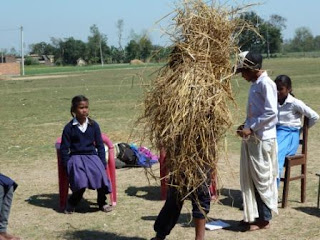OR What can I buy for an Australian dollar or two?
Today’s exchange rate as per Republica newspaper is 1AUD – R78/, more than it was when I arrived last November. I’ll let you do the calculations of dollar and cents.
Lunch at a cafe: a plate of veg momos R55/ or Masala Dhosa R50/
2-egg omelette and puffed rice at the DEO teashop R30/
Cup of black tea with lemon R5/
Small bottle of sprite etc R30/
Repairing the puncture on my bike R20/
Pumping up my tyres R5/ - actually my family told me it’s 2 each tyre, but I always offer a R5 note
Bus fare for the hour ride to Lumbini for me and my cycle R50/
English newspaper R3/ or R5/
Yak cheese 100g R55/
1 kg tomatoes R20/
1kg eggplant R10/
250g green capsicum R15/
300ml bag of milk R21/
Cup of yoghurt 200ml R20/
500ml bag of yoghurt R38/
Muesli 400g packet R85/
6 bananas R25/
2kg whole-wheat flour R74/
Butter 250 g R125/
Material to make a pair of plain pants, R165/ and to stitch them R100/
A suit – material for matching pants, top, scarf and then stitched for me approx R1000/
Electricity per month on average approx 300, but this month my bill was 408 – did I mention it’s hot here and so I like using the ceiling fan? Plus the power cuts are less than in the cold season.
A 5 day course of antihistamine tablets plus a small tube of eye cream to help a fellow volunteer recover from their effort to beautify themself with hair dye R48/ (It was me who went to the pharmacy to buy as their eye was so swollen, didn’t want to cycle, no problem to buy products clearly labelled ‘not without prescription’)
 |
| veg momos at Mokhan Bhog, a favourite lunch spot |
This entry lacks the photos I anticipated, will aim to add some more over the coming days ......
















































